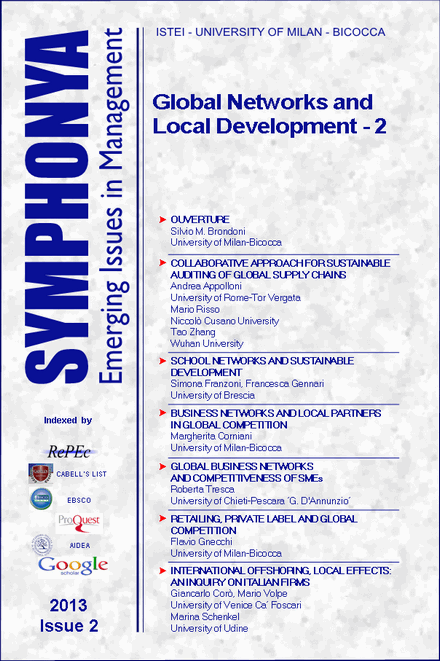Ouverture de ‘Global Networks and Local Development-2’
DOI:
https://doi.org/10.4468/2013.2.01ouvertureKeywords:
Global Markets, Global Networks, Innovation, Imitation, Creative Imitation, Local Development, Chinese Organisations, Indian Organisations, Italian SMEsAbstract
The global boundaries of innovation, creative imitation and imitation have significantly changed the relative position of many Nation-States and their competitive positions face to global networks and local firms’ development. Chinese production organisations, not casually, are actually involved in the global economic growth as a process of continuous technological innovation and industrial upgrading (creative imitation), with a massive engagement in the local development. Globalization shifted also India to become an important R&D hub in many industries. After years of self-imposed exclusion (for the long, post-colonial license orientation) India has gone beyond the limit of reverse engineering of products developed elsewhere (creative imitation) and has finally joined the global business of innovation and imitation. Finally, the growth model of Italian businesses abroad is consistent with the characteristics of Italian designer products and the country’s fragmented industrial structure, which are reflected in a ‘global gap’. Italian firms are therefore progressively oriented to confine their competitive policies to internal markets, with productions focused on imitation and creative imitation.
Downloads
Published
How to Cite
Issue
Section
License
The authors retain all rights to the original work without any restrictions.
License for Published Contents

You are free to copy, distribute and transmit the work, and to adapt the work. You must attribute the work in the manner specified by the author or licensor (but not in any way that suggests that they endorse you or your use of the work).
License for Metadata

Symphonya published articles metadata are dedicated to the public domain by waiving all publisher's rights to the work worldwide under copyright law, including all related and neighboring rights, to the extent allowed by law.
You can copy, modify, distribute and perform the work, even for commercial purposes, all without asking permission.



